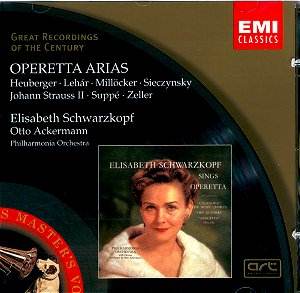Here are three questions:
Why is so much operetta written in three-four
time, waltz time and, therefore, rhythmically limited and
impoverished?
Why is it that when people sing operetta
they sing completely differently, particularly with those
stepping up to or stepping down from notes which sounds so
cheap and as if the singer is uncertain of the note itself?
And that awful portamenti....
Why does operetta sound cheap and inconsequential
compared to grand opera or lieder?
The author of the notes has one answer. The style
of singing in operettas has always been associated with the art
of seduction. In other words it is sexy singing and therefore
on some parallel with pop music today which, in the main, is sex
to music.
Well that may be taking it too far.
But if there is to be a style in singing operetta
who decided on the way it is sung and sung for perpetuity?
Is it that musicals of today or of comparatively
recent years were the operettas of yesterday? Does Lehár's
Graf von Luxemburg have the same ingredients, design and purpose
as Rodgers and Hammerstein's Oklahoma?
I think the answer lies in the distinction between
singers and entertainers. Frank Sinatra was not a good singer
particularly in later years. He could not sing in tune and so
I cannot class him as a singer but he was a magnificent entertainer.
I went to his concert in London and it was superb. I cannot think
of a pop singer who is always in tune but some have a tremendous
ability to entertain but they are certainly not singers. This
is why so much pop music has extra notes before and after the
one written in the hope that the singer might get it somewhere
in the melismata.
Pete Waterman, a pop record producer, said on
national television that writing a pop song was the hardest thing
in the world to do. So, as an example, I suppose Bruckner writing
his amazing and mammoth Symphony no 8 was easy!
But we must not be snobs. There is good music
is almost every field. Duke Ellington and King Oliver in jazz
were giants, Bessie Smith and Billy Holliday were magnificent
in blues. Ella Fitzgerald was a star, Alex North and Jerry Goldsmith
unequalled in film music and some music hall songs were very accomplished
(and some rather rude) and so on.
None of the composers represented here were great
composers. Far from it. Suppé is the best of the bunch
and his overtures such a Light Cavalry, Poet and Peasant and Boccaccio
are good in their own genre. But he was only really popular in
Vienna. He did not compose any work of consequence. But Boccaccio,
which I would have termed an opera, is a love story whereas all
the other operettas are seedy or sex comedies. Heuberger's The
Opera Ball is a tasteless sex comedy, Carl Zeller's Birdseller
is about tangled relationships, Lehár's Der Zarewitsch
is apparently about feminism and The Count of Luxemburg is about
an impoverished nobleman who is to marry for money and has never
seen his bride until the wedding. Johann Strauss the Second's
Casanova is about the depraved sexual philanderer presumably out
to corrupt Laura before she enters the convent. Millöcker's
operetta is about a mistress of Louis XV.
All pretty seedy stuff and by composers who were
useless at writing quality music. For example, Lehár tried
to write sonatas and a violin concerto which are dire. But it
is only light music and of little consequence. And there some
musicians who cannot aspire to the real stuff. Willy Boskovsky
would not conduct Brahms or Stravinsky and thank goodness for
that.
But this music is fun at times and mildly diverting
and it suits many people who, perhaps, cannot take quality music
and are content with this entertaining fun.
The performance of the Nunsí Chorus is attractive
with the chorus parts and the tolling bell but the Viennese portamenti
are irritating. Carl Zeller Don't be cross is a fun piece but
too slow and the best item on the disc is Robert Sieczynsky's
Vienna City of my dreams which was composed by a Polish composer,
not a Viennese one, and it is the best vocal waltz I know. But
it is also too slow.
Schwarzkopf varies her voice within items. For
example, in the Nun's Chorus she is at one time a little girl
or a young lady with a purity of voice and innocence and then
a voluptuous belter of a singer. It does not make sense.
As occasional listening and music which needs
no thought it will be entertaining but not very durable.
David C F Wright
see Great
Recordings of the Century

